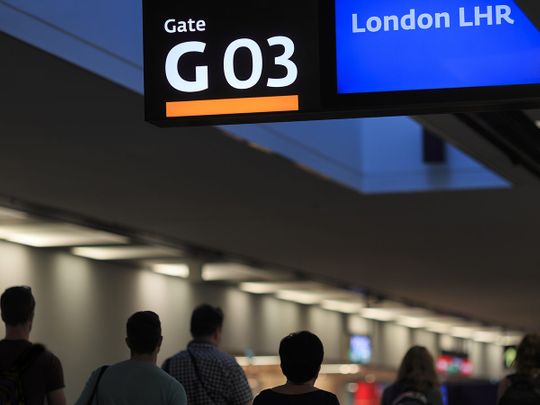
Dubai: The disruptions at UK airports have not affected flights operations to UAE and the Gulf, according to travel industry sources.
Emirates airline, which operates multiple daily flights from Dubai to London, said its flights to Heathrow are operating as per normal schedule. A British Airways sales official said the airline’s daily flights to Dubai have not been affected until now. “We have not received a circular from the London office, informing us of any strike-related disruptions.”
Travel agents contacted by Gulf News said they did not see any major cancellations or delays on flights to UAE from the UK and vice versa. “Airlines usually communicate any delays to us ahead of time and that has not happened yet,” said T.P. Sudheesh, General Manager at Deira Travel & Tourist Agency.
Hundreds of flights were cancelled from Heathrow and Gatwick airports on Tuesday as airlines struggled to meet a surge in travel demand. Last week, more than 150 short-haul flights got cancelled on the eve of the four-day Platinum Jubilee weekend as airlines were completely overwhelmed by an influx of holidaymakers.
Adding on to the aviation sector’s woes is the prospect of a strike by British Airways staff at Heathrow. Many of the airline’s check-in and ground staff have started voting on the strike action.
Long-haul not affected
Airlines are struggling to ramp up hiring and bolster their staff numbers after making massive layoffs during the pandemic. British Airways alone announced as many as 10,000 jobs were cut and put almost 25,000 staff on furlough.
John Grant, Partner at Midas Aviation, said staff shortages are being observed across the industry and this includes those at airports, ground handlers and system suppliers. “It’s easier to operate a long-haul service than the repeated pressure of a short-haul service where aircraft are being turned around in 40 minutes throughout the day,” said Grant.
When it comes to long-haul aircraft, the process of moving baggage into the aircraft is more automated, said Grant. “For short-haul, that is typically a manual process with 3-4 loaders involved per turnaround.”
Steady on fares
Dubai-London flights are going for anywhere between Dh1,500-Dh2,000, in-line with the normal seasonal rates for the route. Fares are seen almost doubling from Abu Dhabi, with Etihad Airways’ charging more than Dh3,000 on most flights.
In May, Dubai-London was the fifth busiest international route in the world with more than 212,000 seats deployed by airlines.
Blame game
The issue at UK airports has snowballed into a war of words between the airline industry and the UK government. Last week, UK’s Transport Secretary Grant Shapps criticized airlines for over-selling tickets to passengers amid capacity constraints. He also said that airline bosses should have been preparing for a surge in passenger demand following two years of travel closures.
Airlines have struck back, with IATA chief Willie Walsh reportedly calling Shapps ‘absolutely useless’ in his approach to the COVID-19 crisis. “As minister of transport, he’s done nothing for the industry,” said Walsh at a conference in Paris.
Industry-wide impact
Regardless of where the fault lies, airlines are already seeing an impact. Wizz Air, one of Europe’s largest low-cost airlines, said it expects to report a first quarter loss. “The airline industry remains exposed to externalities such as air traffic control disruption and continuing operational issues within the airports sector, adding to a volatile macro environment,” said József Váradi, Wizz Air’s CEO. “As a result, at this point, we are not providing further financial guidance for the year.”
“We believe the increasing cost of air travel will not deter people from flying, at least through this summer and likely through this year – and absent a global recession,” said Moody’s in a report. “Travelers can shorten trips by one day or scale down their cost of lodging, rental cars and entertainment to help offset higher airfare.”
In the second-half of the year, the impact of cost inflation on discretionary incomes and budgets would lead to a ‘softening’ of aggregate air travel demand, said Moody’s. “In some way, the current capacity constraints would protect the airlines from having too much capacity, should this occur.”








